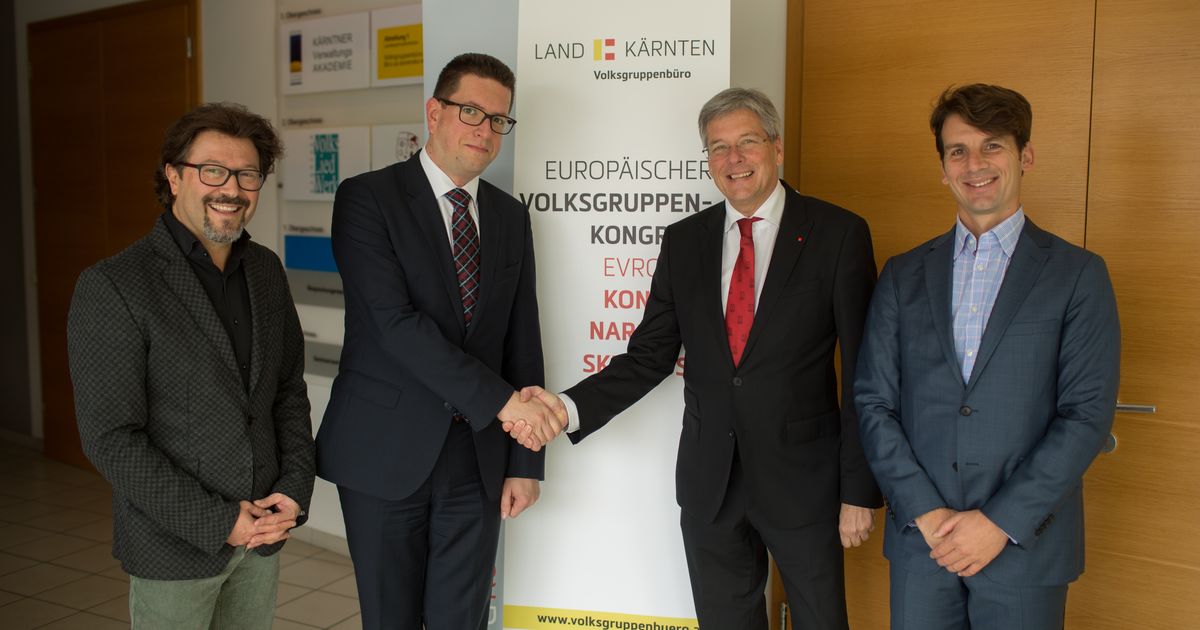
Ethnic identities and globalization - the 27th Ethnic Minority Congress in Klagenfurt, Austria
21.11.2016FUEN President Loránt Vincze was invited by the Governor of Carinthia Dr Peter Kaiser to hold a lecture about the connections between ethnic, national and European identities at the 27th Congress of Ethnic Minorities. The event was organized by the Government of Carinthia last week in Klagenfurt, capital of the region (land), where the speakers mainly discussed about the effects of globalization, mass immigration on Europe and its autochthonous minorities, with special focus on the Slovenian community in Carinthia.
President Vincze first talked about the processes in the autochthonous minority protection field in nowadays Europe. In his opinion this process has local, regional and state level impact, but bear European consequences as well. He stated: “In the past two and half decades Europe had to answer many questions, namely: how lasting peace can be reached, how majorities and minorities can live in peace, work and develop together despite the strong historical differences and stereotypes.” He praised the obvious results of the European minority protection system but he also stated that the EU and the member states still have a long way to go and they need to act responsibly for their minorities. “If we all belong to the same European space, minority groups in similar situations should have the same chance for protection. The FUEN believes that the substantial differences need to be met, and balanced because it should not be a matter of chance what kind of protection minority groups in similar situations get just because they live in one corner of Europe or the other.” - explained Mr Vincze.
According to him, minority protection is especially important in an era when ethnic and national boundaries start to fade due to free movement and globalisation: people, especially the youth of different nationalities think and behave alike while speaking multiple languages with each other. "The community may live only if the new generations get to know more about their roots and keep a healthy dose of national or cultural conscience. This is particularly important in the case of minority groups, which are otherwise doomed to assimilation and fragmentation if this kind of individualism wins." - he added. Mr Vincze announced that the challenge of modernity for the minority communities and their contribution to the European cultural and language heritage would be the main topics of the FUEN Congress next year in Kolozsvár / Cluj-Napoca / Klausenburg.
Loránt Vincze also said that regionalism now lives its renaissance and minority groups are even more devoted to the cause because many of them live in compact communities in a certain area and the homeland’s autonomy, a form of regionalism, is an objective that many European minorities thrive for. “Nationalism as societal and ideological development has shown its limits in the European society. The unitary nation-state is usually a forced marriage of the regions since it attempts to mash and imply a uniform shape to millions of people with different cultural and social backgrounds, speaking different languages and have different cultural backgrounds. Even though unifying nationalism was a clear adversary of regionalism in the past, history has proven that regional identities cannot be simply eliminated and today they are two levels of identity construction which do not exclude one another. " - explained the President of the FUEN in Klagenfurt.

Пресс релизы
- FUEN wishes you a peaceful Christmas season, restful days and a bright, hopeful start to the new year!
- FUEN calls on the EU to act over systematic ethnic-based land confiscations in Slovakia
- Women of Minorities conference in Budapest calls for structural change to ensure equal political participation of minority women
- FUEN President Olivia Schubert at UN Forum on Minority Issues in Geneva
- "Laboratory of Peace": 28th Seminar of Slavic Minorities held in European Capital of Culture Gorica/Gorizia
- Equality in Political Participation and Representation: Third “Women of Minorities” Conference to Be Held in Budapest
- FUEN Working Group on Education discusses challenges and future of minority schooling in Europe
- 28th Seminar of Slavic Minorities in Europe to take place in Gorica/Gorizia, Italy
- Olivia Schubert in her first interview as FUEN President
- FUEN Assembly of Delegates elects new leadership – Olivia Schubert becomes new President














